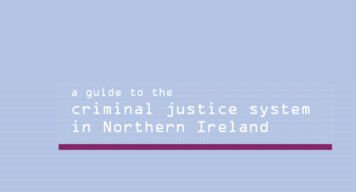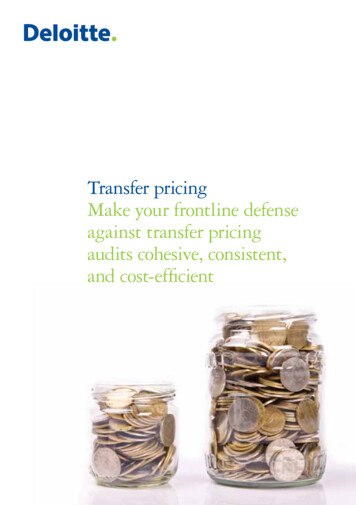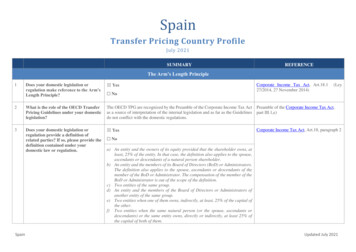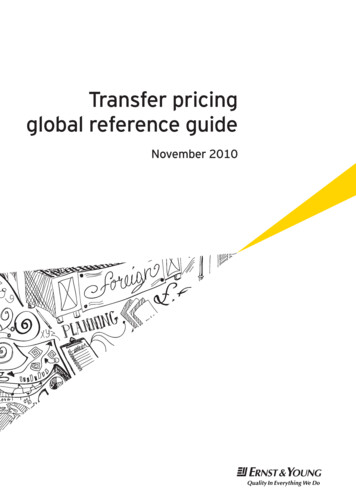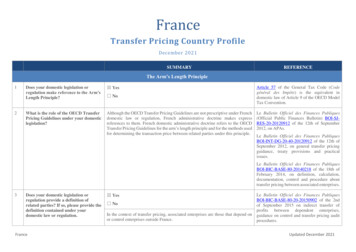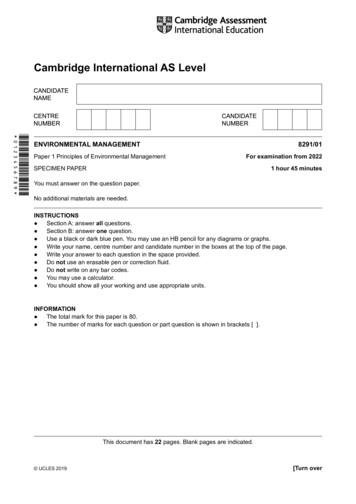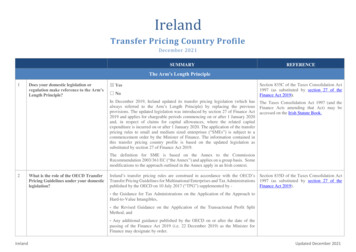
Transcription
IrelandTransfer Pricing Country ProfileDecember 2021SUMMARYREFERENCEThe Arm’s Length Principle1Does your domestic legislation orregulation make reference to the Arm’sLength Principle? Yes NoIn December 2019, Ireland updated its transfer pricing legislation (which hasalways referred to the Arm’s Length Principle) by replacing the previousprovisions. The updated legislation was introduced by section 27 of Finance Act2019 and applies for chargeable periods commencing on or after 1 January 2020and, in respect of claims for capital allowances, where the related capitalexpenditure is incurred on or after 1 January 2020. The application of the transferpricing rules to small and medium sized enterprises (“SMEs”) is subject to acommencement order by the Minister of Finance. The information contained inthis transfer pricing country profile is based on the updated legislation assubstituted by section 27 of Finance Act 2019.Section 835C of the Taxes Consolidation Act1997 (as substituted by section 27 of theFinance Act 2019).The Taxes Consolidation Act 1997 (and theFinance Acts amending that Act) may beaccessed on the Irish Statute Book.The definition for SME is based on the Annex to the CommissionRecommendation 2003/361/EC (“the Annex”) and applies on a group basis. Somemodifications to the approach outlined in the Annex apply in an Irish context.2What is the role of the OECD TransferPricing Guidelines under your domesticlegislation?Ireland’s transfer pricing rules are construed in accordance with the OECD’sTransfer Pricing Guidelines for Multinational Enterprises and Tax Administrationspublished by the OECD on 10 July 2017 (“TPG”) supplemented by -Section 835D of the Taxes Consolidation Act1997 (as substituted by section 27 of theFinance Act 2019).- the Guidance for Tax Administrations on the Application of the Approach toHard-to-Value Intangibles,- the Revised Guidance on the Application of the Transactional Profit SplitMethod, and- Any additional guidance published by the OECD on or after the date of thepassing of the Finance Act 2019 (i.e. 22 December 2019) as the Minister forFinance may designate by order.IrelandUpdated December 2021
3Does your domestic legislation orregulation provide a definition ofrelated parties? If so, please provide thedefinition contained under yourdomestic law or regulation. YesSection 835B of the Taxes Consolidation Act1997 (as substituted by section 27 of theFinance Act 2019). NoIreland’s domestic legislation provides a definition of “associated”, as below:(1) For the purposes of this Part —(a) 2 persons are associated at any time if at that time —i: one of the persons is participating in the management, control or capital of theother, orii: the same person is participating in the management, control or capital of eachof the 2 persons, and(b) a person (in this paragraph referred to as the ‘first person’) is participating inthe management, control or capital of another person at any time only if that otherperson is at that time —i: a company, andii: controlled by the first person.Transfer Pricing Methods4Does your domestic legislation providefor transfer pricing methods to be usedin respect of transactions betweenrelated parties? YesSection 835D of the Taxes Consolidation Act1997 (as substituted by section 27 of theFinance Act 2019). NoIf affirmative, please check those provided for in your ther (If so,please describe) Ireland’s domestic legislation is to be construed in accordance with the TPG and,accordingly, provides for the transfer pricing methods that are set out in the TPG.“Other” methods may be acceptable, in accordance with paragraph 2.9 of the TPG.5Which criterion is used in yourjurisdiction for the application oftransfer pricing methods?Please check all that apply: Hierarchy of methodsSection 835D of the Taxes Consolidation Act1997 (as substituted by section 27 of theFinance Act 2019). Most appropriate method Other (if so, please explain)IrelandUpdated December 2021
In accordance with the TPG, the most appropriate method is used for theapplication of transfer pricing methods.6If your domestic legislation orregulations contain specific guidance oncommodity transactions, indicate whichof the following approaches is followed. For controlled transactions involving commodities, the guidance contained inparagraphs 2.18-2.22 of the TPG is followed. Domestic legislation mandates the use of a specific method for controlledtransactions involving commodities (if so, please explain)Section 835D of the Taxes Consolidation Act1997 (as substituted by section 27 of theFinance Act 2019). Other (if so, please explain)Ireland’s transfer pricing rules are construed in accordance with the TPG.Comparability Analysis7Does your jurisdiction follow (or largelyfollow) the guidance on comparabilityanalysis outlined in Chapter III of theTPG? Yes NoSection 835D of the Taxes Consolidation Act1997 (as substituted by section 27 of theFinance Act 2019).Ireland’s transfer pricing rules are construed in accordance with the TPG.8Is there a preference in yourjurisdiction for domestic comparablesover foreign comparables? Yes NoIn line with the EU Code of Conduct on Transfer Pricing Documentation (EUTPD) adopted by the European Council on 27 June 2006, Ireland accepts Europeancomparables. If there are insufficient European comparables, Ireland may acceptother foreign comparables.910IrelandDoes your tax administration use secretcomparables for transfer pricingassessment purposes? YesDoes your legislation allow or requirethe use of an arm’s length range and/orstatistical measure for determiningarm’s length remuneration? Yes No NoSection 835D of the Taxes Consolidation Act1997 (as substituted by section 27 of theFinance Act 2019).Ireland’s transfer pricing rules are construed in accordance with the TPG,including the guidance on the use of an arm’s length range and statistical measuresfor determining an arm’s length remuneration in Chapters II and III.Updated December 2021
11Are comparability adjustmentsrequired under your domesticlegislation or regulations? YesSection 835D of the Taxes Consolidation Act1997 (as substituted by section 27 of theFinance Act 2019). NoIreland’s transfer pricing rules are construed in accordance with the TPG,including the guidance on comparability adjustments in Chapters II and III.Intangible Property121314Does your domestic legislation orregulations contain guidance specificto the pricing of controlledtransactions involving intangibles? YesDoes your domestic legislation orregulation provide for transfer pricingrules or special measures regardinghard-to-value intangibles (HTVI)? YesAre there any other rules outsidetransfer pricing rules that arerelevant for the tax treatment oftransactions involving intangibles? YesSection 835D of the Taxes Consolidation Act1997 (as substituted by section 27 of theFinance Act 2019). NoIreland’s transfer pricing rules are construed in accordance with the TPG.Section 835D of the Taxes Consolidation Act1997 (as substituted by section 27 of theFinance Act 2019). NoIreland’s transfer pricing rules are construed in accordance with the TPG,supplemented by the Guidance for Tax Administrations on the Application of theApproach to Hard-to-Value Intangibles.HTVI Implementation Questionnaire NoSection 291A (as amended) of the Taxes Consolidation Act 1997 provides forcapital allowances in respect of the acquisition of specified intangible assets.Intra-Group Services15Does your domestic legislation orregulations provide guidance specificto intra-group services transactions? Yes NoSection 835D of the Taxes Consolidation Act1997 (as substituted by section 27 of theFinance Act 2019).Ireland’s transfer pricing rules are construed in accordance with the TPG.16IrelandDo you have any simplified approachfor low value-adding intra-groupservices? Yes NoUpdated December 2021
Ireland’s transfer pricing rules are construed in accordance with the TPG.17Are there any other rules outsidetransfer pricing rules that arerelevant for the tax treatment oftransactions involving services?Section 835D of the Taxes Consolidation Act1997 (as substituted by section 27 of theFinance Act 2019). Yes NoFinancial Transactions18[NEW] Does your domestic legislationor regulations provide guidancespecific to financial transactions? Yes NoSections 835C and 835D of the TaxesConsolidation Act 1997 (as substituted bySection 27 of the Finance Act 2019).Financial transactions are subject to the general transfer pricing rules, which areconstrued in accordance with the TPG.See Section 4.4.2 of the Revenue, Tax and DutyManual, Transfer Pricing, Part 35A-01-01The Irish transfer pricing legislation refers to the 2017 TPG, which does notinclude the new Chapter X (Transfer Pricing Guidance on Financial Transactions).While this specific additional guidance has not yet been implemented into Irishlaw, and is subject to a future Ministerial Order, it will be considered as bestpractice by the Irish Revenue when analysing transfer pricing issues associatedwith financial transactions.19[NEW] Are there any other rulesoutside transfer pricing rules that arerelevant for the tax treatment offinancial transactions? Yes NoSection 31 of the Finance Bill 2021 (as initiated)contains the proposed interest limitation rules.Ireland has extensive and long-standing rules in place to prevent abuse of interestdeductions in calculating taxable profits.In addition, Ireland is in the process of implementing the interest limitationrules/measures in the ATAD/ATAD 2. These provisions have been included inFinance Bill 2021, as initiated, and will apply to accounting periods commencingon or after 1 January 2022.IrelandUpdated December 2021
Cost Contribution Agreements20Does your jurisdiction have legislationor regulations on cost contributionagreements? YesSection 835D of the Taxes Consolidation Act1997 (as substituted by section 27 of theFinance Act 2019). NoIreland’s transfer pricing rules are construed in accordance with the TPG.Transfer Pricing Documentation21Does your legislation or regulationsrequire the taxpayer to preparetransfer pricing documentation? Yes NoSection 835G of the Taxes Consolidation Act1997 (as substituted by section 27 of theFinance Act 2019)If affirmative, please check all that apply: Master file consistent with Annex I to Chapter V of the TPGCountry-by-country reporting is legislated byway of: Local file consistent with Annex II to Chapter V of the TPG Country-by-country report consistent with Annex III to Chapter V of theTPG Specific transfer pricing returns (separate or annexed to the tax return) Other (specify):Section 891H of the Taxes Consolidation Act1997 (as inserted by section 33 of the FinanceAct 2015 and as amended by section 24(1) ofthe Finance Act 2016), andS.I. No. 653 of 2016, Taxes (Country-byCountry Reporting) Regulations 2016A taxpayer must have available such documentation as may reasonably be requiredto demonstrate compliance with transfer pricing legislation.The requirement to prepare a master file applies where the total consolidated globalrevenue of the MNE group is or is likely to be at, or above, EUR 250 million inthe chargeable period.The requirement to prepare a local file applies where the total consolidated globalrevenue of the MNE group is or is likely to be at, or above, EUR 50 million in thechargeable period.22IrelandPlease briefly explain the relevantrequirements related to filing oftransfer pricing documentation (i.e.timing for preparation or submission,languages, etc.)Country-by-country reports must be filed within 12 months from the end of eachfiscal year (for example, by 31 December 2021 for fiscal years ending 31December 2020).In relation to transfer pricing documentation, the legislation requires that ataxpayer company have such records (including, where applicable, a local fileand master file) available as may reasonably be required to demonstrateCountry-by-country reporting is legislated byway of:Section 891H of the Taxes Consolidation Act1997 (as inserted by section 33 of the FinanceUpdated December 2021
compliance with transfer pricing legislation. The documentation must beprepared no later than the date on which the tax return for the chargeable periodis due to be filed. Where a Revenue officer makes a written request for suchdocumentation, it must be provided to the Revenue within 30 days from the dateof the request. The documentation must be kept in Irish or English.Act 2015 and as amended by Section 24(1) ofthe Finance Act 2016), andS.I. No. 653 of 2016, Taxes (Country-byCountry Reporting) Regulations 2016The legislative requirement for generaltransfer pricing documentation is contained inSection 835G of the Taxes Consolidation Act1997(as substituted by section 27 of theFinance Act 2019).23Does your legislation provide forspecific transfer pricing penaltiesand/or compliance incentivesregarding transfer pricingdocumentation? Yes NoThe penalty for a failure to file a country-by-country report/equivalent country-bycountry report is EUR 19 045 plus EUR 2 535 for each day the failure continues.The penalty for filing an incomplete or incorrect country-by-countryreport/equivalent country-by-country report is EUR 19 045.Where a person fails to comply with the requirement to provide transfer pricingdocumentation within 30 days of a written request, a fixed penalty of EUR 4 000will apply. Where a person is of such size that it is required to prepare a local file,the fixed penalty is increased from EUR 4 000 to EUR 25 000 plus EUR 100 foreach day on which the failure continues. The increased fixed penalty applies wherethe person has failed to provide any required transfer pricing documentation, andthis is not limited to failure to provide the local file.Penalties in relation to country-by-countryreporting are provided for in section 891H (7)of the Taxes Consolidation Act 1997 (asinserted by section 33 of the Finance Act 2015and as amended by section 24(1) of theFinance Act 2016).Penalties in relation to general transfer pricingdocumentation are provided for in section835G of the Taxes Consolidation Act 1997 (assubstituted by section 27 of the Finance Act2019).In addition, where a transfer pricing adjustment results in additional tax due, thetransfer pricing legislation provides for protection from tax-geared penalties incircumstances where the taxpayer has fully complied with transfer pricingdocumentation requirements and demonstrates reasonable efforts were made inapplying transfer pricing to the arrangement. This protection from tax-gearedpenalties does not apply in the case of deliberate behaviour by the taxpayer tounder-declare a tax liability.24IrelandIf your legislation provides forexemption from transfer pricingdocumentation obligations, pleaseexplain.In line with the OECD model legislation, country-by-country reportingrequirements only apply to multinational enterprises with annual consolidatedgroup revenue equal to or exceeding EUR 750 million in the preceding fiscal year.Section 835F of the Taxes Consolidation Act1997 (as substituted by section 27 of theFinance Act 2019)Ireland’s legislation provides for simplified transfer pricing documentationrequirements in respect of SMEs. When SMEs are brought within the scope oftransfer pricing rules under Ministerial Order, a small enterprise will not berequired to provide transfer pricing documentation and medium enterprises will beUpdated December 2021
required to have available simplified transfer pricing documentation in respect ofcertain arrangements.Administrative Approaches to Avoiding and Resolving Disputes25Which mechanisms are available inyour jurisdiction to prevent and/orresolve transfer pricing disputes?Please check those that apply:Bilateral APA Guidelines RulingsMAP Guidance Enhanced engagement programs Advance Pricing Agreements (APA)Ireland’s MAP Profile Unilateral APAs Bilateral APAs Multilateral APAs* Mutual Agreement Procedures Other (please specify):*Ireland will consider engaging in multilateral APAs by way of a series of bilateralAPAs.For more information on APAs in Ireland, refer to Ireland’s MAP Profile andBilateral APA Guidelines.For more information on MAPs in Ireland, refer to Ireland’s MAP Profile andMAP Guidance.Safe Harbours and Other Simplification Measures2627IrelandDoes your jurisdiction have rules onsafe harbours in respect of certainindustries, types of taxpayers, or typesof transactions? YesDoes your jurisdiction have any othersimplification measures not listed inthis questionnaire? If so, pleaseprovide a brief explanation. Yes No NoUpdated December 2021
Other Legislative Aspects or Administrartive Procedures28Does your jurisdiction allow/requiretaxpayers to make year-endadjustments? YesSection 835C of the Taxes Consolidation Act1997 (as substituted by section 27 of theFinance Act 2019). NoAdjustments are allowed to the extent that they are appropriate to the yearconcerned and are in accordance with the Arm’s Length Principle.29Does your jurisdiction makesecondary adjustments? Yes NoAttribution of Profits to Permanent Establishments30[NEW] Does your jurisdiction followthe Authorised OECD Approachesfor the attribution of profits to PEs(AOA)? Yes NoCurrently only 2 treaties that are in force and in effect contain the new version ofArticle 7.Ireland is in the process of implementing legislation that will provide for theapplication of the Authorised OECD Approach for the attribution of income to abranch of a non-resident company operating in the State. These provisions havebeen included in Finance Bill 2021, as initiated, and will apply to accountingperiods commencing on or after 1 January 2022.31[NEW] Does your jurisdiction followalso another approach?Section 28 of the Finance Bill 2021 (as initiated)contains the proposed legislation that willprovide for the application of the AuthorisedOECD Approach. Yes NoNon-resident companies trading in Ireland through a branch or agency arechargeable to corporation tax in accordance with section 25 TCA 1997. Undersection 25(1) TCA 1997, a company that is not resident in the State is within thecharge to corporation tax if it carries on a trade in the State through a branch oragency. If it does so, the non-resident company is chargeable to corporation tax onall of its chargeable profits, wherever arising. Under section 25(2) TCA 1997, thechargeable profits of such a non-resident company comprise (i) any tradingincome arising directly or indirectly through or from the branch or agency, and anyincome from property or rights used by, or held by or for, the branch or agency(“relevant branch income”), and (ii) chargeable gains attributable to the branch oragency.IrelandUpdated December 2021
As noted above, Ireland is in the process of implementing legislation that willprovide for the application of the Authorised OECD Approach for the attributionof relevant branch income to a branch of a non-resident company operating in theState. These provisions have been included in Finance Bill 2021, as initiated, andwill apply to accounting periods commencing on or after 1 January 2022.Other Relevant Information3233Other legislative aspects oradministrative procedures regardingtransfer pricingRevenue has published guidance on both Bilateral Advance Pricing Agreementsand Mutual Agreement Procedures.Bilateral APA GuidelinesOther relevant information (e.g.,whether your jurisdiction is preparing newtransfer pricing regulations, or otherrelevant aspects not addressed in thisquestionnaire)Prior to the amendment of Ireland’s transfer pricing legislation by Section 27 ofFinance Act 2019, Ireland’s transfer pricing rules were contained in Part 35A ofthe Taxes Consolidation Act 1997 (as inserted by Section 42 of the Finance Act2010). Section 27 of Finance Act 2019 amends the Taxes Consolidation Act 1997by substituting a new Part 35A.Section 42 of the Finance Act 2010Guidelines on Requesting MAP AssistanceFor more information, please visit: landUpdated December 2021
Transfer Pricing Country Profile December 2021 SUMMARY REFERENCE . one of the persons is participating in the management, control or capital of the other, or ii: the same person is participating in the management, control or capital of each . See Section 4.4.2 of the Revenue, Tax and Duty Manual, Transfer Pricing, Part 35A-01-01 (a .
